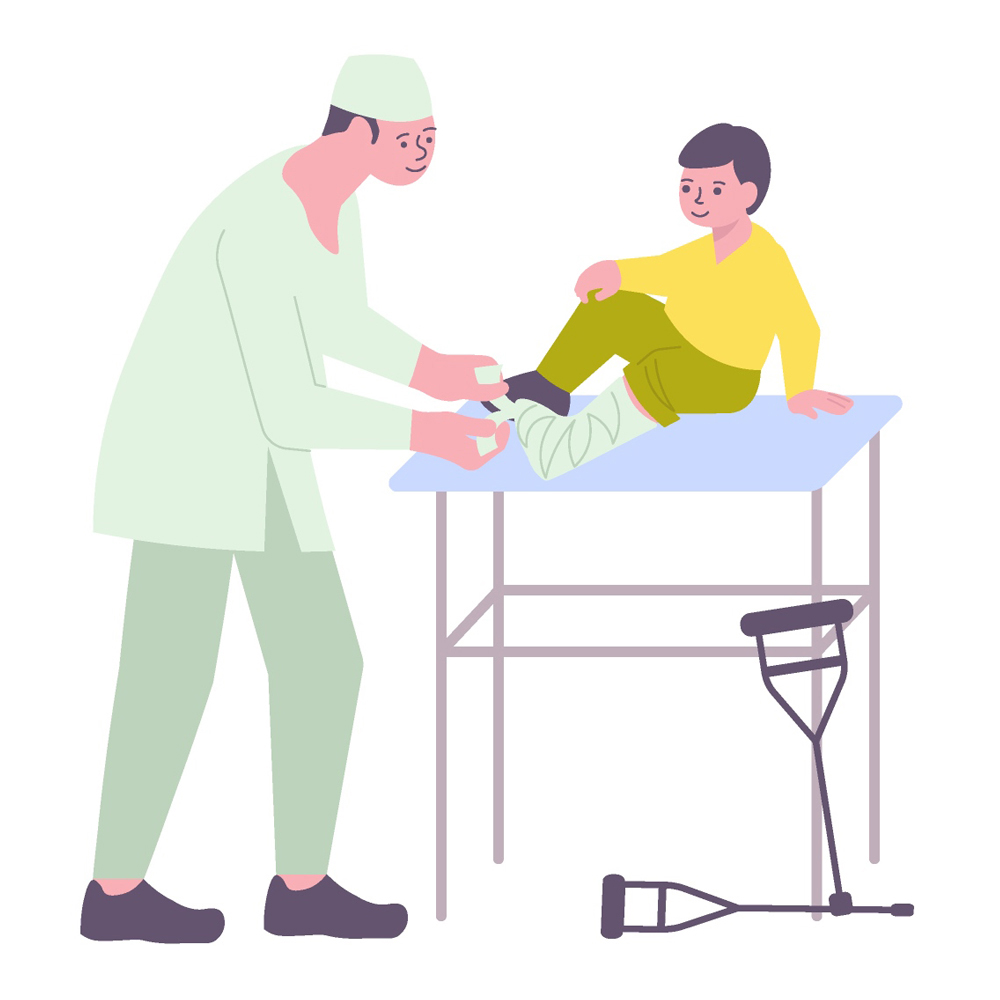Falls, accidents, and sports injuries can cause bones to break in children.
Paediatric Orthopaedics
Paediatric orthopaedics is a subspecialty of orthopaedic surgery that deals with the treatment of musculoskeletal disorders in children. This includes conditions such as broken bones, clubfoot, hip dysplasia, scoliosis, and growth plate injuries.
Paediatric orthopaedic surgeons are specially trained to diagnose and treat these conditions in children, taking into consideration the unique growth and development of a child's body. They use specialized techniques and equipment designed for children, and work closely with paediatricians, physical therapists, and other medical professionals to provide comprehensive care.
The goal of paediatric orthopaedics is to restore function, reduce pain, and improve quality of life for children with musculoskeletal disorders. Treatment may range from non-surgical approaches, such as physical therapy and bracing, to surgical intervention.
It is important for parents to seek the care of a paediatric orthopaedic specialist when their child has a musculoskeletal condition to ensure that the best possible outcome is achieved.
Book Your Appointment
Causes of Paediatric fractures
-
Trauma
-
Osteogenesis Imperfecta (Brittle Bone Disease)
A genetic condition that causes bones to break easily.
-
Overuse injuries
Repetitive stress on bones, such as in sports, can lead to fractures in children.
-
Weak bones
Children with weakened bones due to conditions such as osteoporosis are at a higher risk of fractures.
-
Bone tumors
Tumors can weaken bones, making them more susceptible to fractures.
-
Illnesses
Certain illnesses, such as cancer, can affect bone health and increase the risk of fractures in children.
-
Vitamin D and Calcium Deficiencies
Children with deficiencies in these essential vitamins and minerals are at a higher risk of fractures.

Why everybody recommends Eazy Surgery for knee replacement?
We provide the most full medical services, so every person could have the
pportunity o receive qualitative medical help.
Quality and trust
Doctors driven
Assisted Surgery Experience
Medical Expertise With Technology
Post Surgery Care
Our Expert Doctors Who Performs this Surgery
Dr. Chethan Nagaraj
Fellowship in Knee & Shoulder Surgery (Aus, NZ, Japan)
Specialist in Joint Replacement & Arthroscopy, Senior Consultant Ortho Surgeon.
Dr.Mithun N Oswal
Fellowship in Joint Replacement and Arthroscopy
Specialist in sports medicine and joint replacement surgery
Senior consultant Ortho surgeon
Dr.Ananda Rao
Fellowship in Joint replacement and Arthroscopy
Specialist in sports medicine and joint replacement surgery
Specialist in complex trauma surgery
Senior consultant Ortho surgeon
Dr. Himanshu Singh
Fellowship in Arthroscopy, Joint replacement, Trauma & Ilizarov Limb Reconstruction
Fellowship in spine surgery
Senior consultant Ortho Surgeon
Frequently Asked Questions?
-
What is paediatric fracture surgery?
Paediatric fracture surgery is a medical procedure performed to repair broken bones in children. The surgery is performed by a pediatricorthopedic specialist and may involve realigning the bones, using pins, screws, or plates to hold the bones in place, or both.
-
Why might my child need fracture surgery?
Your child may need fracture surgery if their broken bone is not aligned correctly or if it is displaced, which can lead to poor healing or long-term problems.
-
What is the recovery time after paediatric fracture surgery?
The recovery time will depend on the type of fracture, the surgical procedure, and the overall health of your child. On average, children can expect to recover in 4-12 weeks.
-
What are the risks associated with paediatric fracture surgery?
Risks associated with paediatric fracture surgery include infection, bleeding, nerve damage, blood clots, and anesthesia complications. Your pediatricorthopedic surgeon will discuss the risks and benefits of the surgery with you and your child before the procedure.
-
What are the alternative treatments for paediatric fractures?
Alternative treatments for paediatric fractures include cast immobilization, splinting, and physical therapy. Your pediatricorthopedic specialist will help you determine the best treatment option for your child based on their specific condition.
-
Is paediatric fracture surgery painful?
Paediatric fracture surgery is typically performed under anesthesia and your child will not feel any pain during the procedure. Pain management techniques may be used post-operatively to minimize discomfort.
-
What should I expect during my child's first appointment with a pediatricorthopedic specialist?
During the first appointment, the pediatricorthopedic specialist will take a complete medical history and perform a physical examination of the affected area. X-rays and other diagnostic tests may also be performed to determine the extent of the injury. The specialist will then recommend a course of treatment, including surgery if necessary.
-
What should I do to prepare my child for the surgery?
Your pediatric orthopedic specialist will provide you with specific instructions on how to prepare your child for the surgery. This may include fasting before the procedure, discontinuing certain medications, and bringing any necessary medical records to the appointment.
-
What should I expect after the surgery?
After the surgery, your child may need to wear a cast or brace and attend physical therapy to help with their recovery. Your pediatricorthopedic specialist will provide you with specific instructions and guidelines for post-operative care.
-
How can I support my child during their recovery?
You can support your child during their recovery by encouraging them to follow their post-operative instructions, attending physical therapy appointments, and helping them with any activities of daily living that may be difficult during their recovery period.

